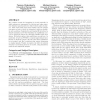Free Online Productivity Tools
i2Speak
i2Symbol
i2OCR
iTex2Img
iWeb2Print
iWeb2Shot
i2Type
iPdf2Split
iPdf2Merge
i2Bopomofo
i2Arabic
i2Style
i2Image
i2PDF
iLatex2Rtf
Sci2ools
SIGECOM
2009
ACM
2009
ACM
Network bargaining: algorithms and structural results
We consider models for bargaining in social networks, in which players are represented by vertices and edges represent bilateral opportunities for deals between pairs of players. Each deal yields some fixed wealth if its two players can agree on how to divide it; otherwise it yields no wealth. In such a setting, Chakraborty and Kearns [5] introduced a simple axiomatic model that stipulates an equilibrium concept in which all players are rationally satisfied with their shares. We further explore that equilibrium concept here. In particular, we give an FPTAS to compute approximate equilibrium in bipartite graphs. We also show that equilibrium is not unique, and give conditions that ensure uniqueness on regular graphs. Finally, we explore the effect of network structure on solutions given by our model, using simulation methods and statistical analysis. Categories and Subject Descriptors F.2.2 [Theory of Computation]: Analysis of Algorithms and Problem Complexity; J.4 [Social and Behav...
Equilibrium Concept | Information Management | SIGECOM 2009 | Simple Axiomatic Model | Social Networks |
Related Content
| Added | 28 May 2010 |
| Updated | 28 May 2010 |
| Type | Conference |
| Year | 2009 |
| Where | SIGECOM |
| Authors | Tanmoy Chakraborty, Michael Kearns, Sanjeev Khanna |
Comments (0)

